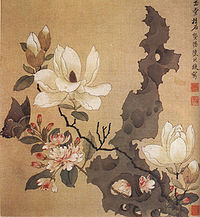- Portal:Culture
-
- Wikipedia portals:
- Culture
- Geography
- Health
- History
- Mathematics
- Natural sciences
- People
- Philosophy
- Religion
- Society
- Technology
- For a topical guide of this subject, see Outline of culture
The Culture Portal
Culture generally refers to patterns of human activity and the symbolic structures that give such activities significance and importance. Cultures can be "understood as systems of symbols and meanings that even their creators contest, that lack fixed boundaries, that are constantly in flux, and that interact and compete with one another"
Culture can be defined as all the ways of life including arts, beliefs and institutions of a population that are passed down from generation to generation. Culture has been called "the way of life for an entire society." As such, it includes codes of manners, dress, language, religion, rituals, norms of behavior such as law and morality, and systems of belief as well as the art.
Selected article
Today the Greeks call themselves Hellenes (Έλληνες), though they have been known by a number of different names throughout history. The soldiers that fell at Thermopylae did so as Hellenes. During the time of Jesus, the term shifted and any person of non-Jewish faith was called Hellene. By late Antiquity, the Greeks referred to themselves as Romaioi, i.e. Romans. Western Europeans used the term Greeks and the Persians and the Turks used the term Yunans, i.e. Ionians. An interesting and unique form is kept in Georgian. In ancient times, Georgians (Colchians and Iberians) called Greeks ბერძენი berdzeni. This form derives from the Georgian word ბრძენი brdzeni – wise. According to Georgian historians, the name is connected with the notion that philosophy was born in Greece. Modern Georgians still call Greeks ბერძენი berdzeni and Greece საბერძნეთი saberdznet'i, 'Greeks' land' or literally 'land of the wise'. The onset of every historical era was accompanied by a new name, either entirely new or formerly old and forgotten, extracted from tradition or borrowed from foreigners. Each of them was significant in its own time, and all can be used interchangeably, which means that the Greeks are a polyonymous people.
Featured picture
A vertical Tibetan prayer flag in the Zanskar region of northern India. The vertical style, called darchor, is less common than the horizontal style, called lungta. Horizontal prayer flags are squares connected at the top edges with a long thread. The vertical prayer flags are usually single squares or groups of squares sewn on poles which are planted in the ground or on rooftops. Unique to Tibetan Buddhism, these flags are panels or rectangles of colourful cloth strung along mountain ridges and peaks in the Himalayas to bless the surrounding countryside. Prayer flags are believed to have originated with the original Bön religion which pre-dated Buddhism in Tibet.
Culture News
Wikinews on Culture and entertainment- November 21: California campus pepper spray police suspended
- November 1: Philippines welcomes world's 7 billionth baby
- October 22: Canadian actress Barbara Kent dies at age 103
- October 17: Herman Cain: SimCity rumor 'a lie'
- October 17: 'Homer Simpson' contributes to U.S. presidential candidate Buddy Roemer
- October 16: Iran continues to lash out at film industry
- October 10: Indian ghazal singer Jagjit Singh dies aged 70
- September 28: Saudi Arabian women gain right to vote, run in elections
- September 13: Copyright on musical recordings extended by twenty years in EU
- September 5: Proms performance by Israel Philharmonic Orchestra disrupted
Featured articles
Selected Featured articles about Culture: Abbey Theatre • Black Seminoles • Flag of South Africa • Gender role • Greco-Buddhism • Kibbutz • Parthenon • Tamil people Categories
WikiProjects
Arts · Community · Culture · Entertainment · History · Languages · Linguistics · Museums · Philosophy · Religion · Travel and Tourism
Things you can do
- contribute to discussion of the use of bullet points on the postmodernism page
Did you know
Subportals
Other Portals
Categories:- Culture portals
- Culture
Wikimedia Foundation. 2010.









